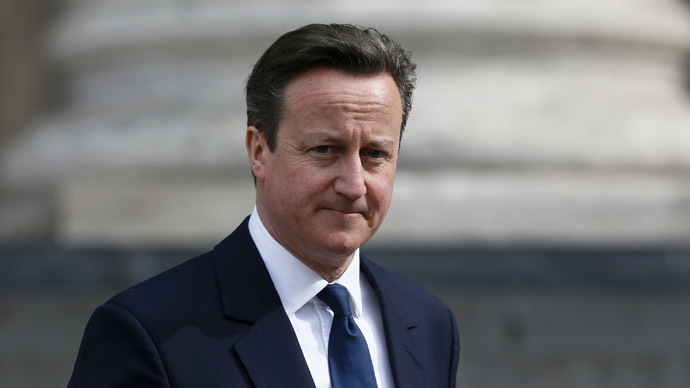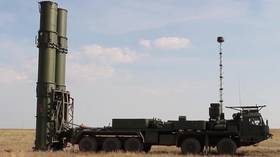Back to Thatcher era? UK creates ‘political & economic reform’ fund for Eastern Europe

Prime Minister David Cameron has announced the creation of a government fund that will provide up to £20 million in its first year to five eastern European countries, including Ukraine, to support ‘stability in the region,’ citing Russian ‘intimidation.’
The ‘Good Governance Fund’ is aimed at supporting the governments of Ukraine, Georgia, Moldova, Serbia and Bosnia and Herzegovina in carrying out political and economic reforms, said Cameron speaking at the EU Summit in Brussels on Friday.
The multi-year program will total £20 million ($30 million, €28 million) in 2015 and 2016. The amount includes £5 million ($7.35 million) of support that was already promised by the Department for International Development (DFID) to Ukraine.
“Ensuring we have strong partners on the EU’s border is not only essential for Britain’s security but our long term prosperity,” said the PM.
“UK expertise can play a crucial role in bringing about the reforms needed to build lasting stability in the region, especially in the face of Russian intimidation, and it is right that we step up our efforts alongside international partners.”
READ MORE: Spies + defense: Cameron proposes budget merge to meet NATO goal
The fund is based on the model of the program set up by former British PM Margaret Thatcher called the Know-How Fund which was set up in 1989, after the fall of the Berlin Wall. It was developed to support countries that had been in the Soviet Union's sphere of influence, such as Czechoslovakia, Hungary, Poland and East Germany.
The announcement comes as EU leaders agreed to maintain economic sanctions against Russia over the Ukrainian crisis until the Minsk-2 deal is “fully implemented,” said European Council President Donald Tusk on Thursday.
Russia has called on its European partners to take action in regards to Kiev's non-compliance with the Minsk peace accord. Moscow particularly addressed Paris and Berlin – the European guarantors of the deal - to react to what it says is Kiev’s undermining of the peace deal.
READ MORE: ‘Glaring breach’: Minsk ‘violation’ sees Russia urge France, Germany to act on Ukraine
On Thursday, Russia submitted a draft resolution to the UNSC supporting the implementation of the Minsk accords, particularly on the issue of the “dialogue between Kiev, Lugansk and Donetsk.” These concern elections in the eastern regions, said Russia’s UN envoy Vitaly Churkin after the closed session.
UK fund to promote ‘accurate news reporting’ in Eastern Europe
The list of activities the new ‘Good Governance Fund’ is aimed to support also includes “strengthening independent media to ensure balanced and accurate news and public affairs reporting.”
This comes as earlier in March, Reuters obtained a copy of the European Council’s draft proposal to the European Commission High Representative for Foreign Affairs, Federica Mogherini. It stated that at the ongoing summit in Brussels Mogherini was to deliver an “action plan” in support of “media freedom” in the EU.
“The European Council stresses the need to challenge Russia's ongoing disinformation campaigns and invites the High Representative... to prepare by the June European Council an action plan on strategic communication in support of media freedom and EU values," the draft said.
The EU is apparently following in the footsteps of the US, which is concerned that Russia’s voice is getting louder.
Recently Secretary of State John Kerry asked US lawmakers for $639 million “to help our friends in Ukraine, Georgia, and Moldova as they seek to strengthen their democracies, and withstand pressure from Russia.”
Kerry stressed that more money is needed for propaganda and “democracy promotion” programs around the world. He particularly mentioned that these should counter RT.
“Russia Today [now known as RT] can be heard in English, do we have an equivalent that can be heard in Russian?” he asked when addressing the House Appropriations Subcommittee on February 26.
READ MORE: For propaganda & 'democracy promotion’: State Dept seeks budget to counter RT
Kerry apparently forgot that Voice of America has been broadcasting in Russian since 1947. RT’s 2015 budget is $220 million while the US government’s media budget is $721 million this year.
The West’s claims of free speech and expression run counter to their actions, Alexander Mercouris, a London-based international affairs analyst, told RT.
“The West has always claimed that it is not into propaganda, believes in free expression and in the free exchange of opinions. And yet here we are – the West setting up what to all intents and purposes sounds like a propaganda channel to broadcast the Western view into Russia. So they are saying one thing and doing the opposite,” he said.
As the UK intends to pour millions in support of Eastern Europe, the country’s government is failing to tackle deepening poverty in the country itself, political analyst John Wight told RT.
“It beggars belief that £20 million can be found to provide 'assistance' to Ukraine, Georgia, etc., yet no money can be found to alleviate the deepening poverty being suffered by 13 million British citizens - 3.5 million of whom are children,” he said.
“This is a country in which 900,000 people required the services of the nation's burgeoning food banks last year, unable to feed themselves and their families as a direct consequence of a war on the poor unleashed under the rubric of austerity, yet the British Government embarks on a policy that will only inflame tensions and further jeopardize the stability of the region.”
Unlike France and Germany, which are “moving towards conciliation with Russia over Ukraine,” London took the “path of confrontation,” he said.
“The announcement of a 'development fund' for nations bordering Russia is evidence that though Britain no longer has an empire, an empire mindset continues to poison the thinking of its political establishment.”












